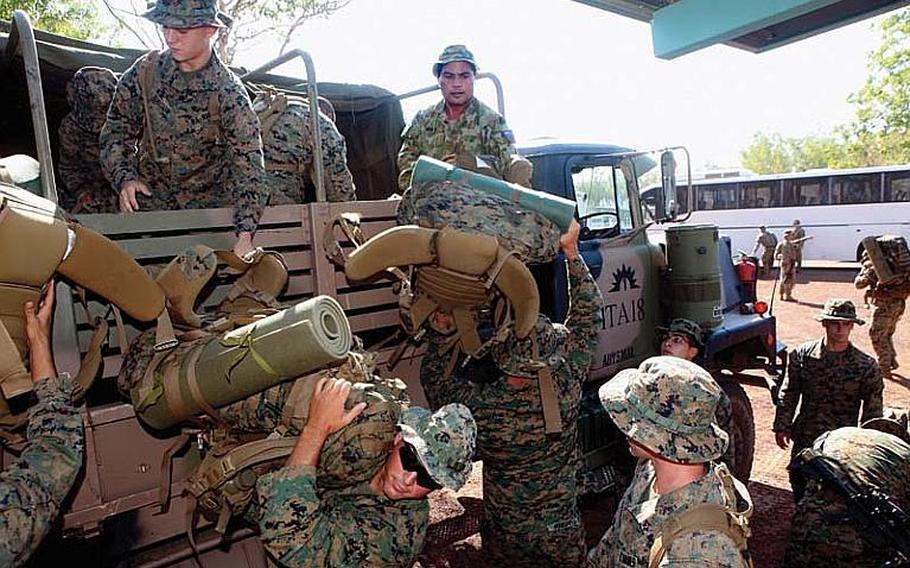
U.S. Marines from the 31st Marine Expeditionary Unit, with help from Australian Defence Force members, unload gear from an Australian military vehicle at the beginning of a bilateral exercise in Darwin on Aug. 1, 2012. A recent survey determined that the Marines were perfect guests during the deployment, adding about $1.8 million into the local economy. (Caleb Eames/U.S. Marine Corps)
CAMP FOSTER, Okinawa — Australia says the first Marines deployed to Darwin this year were good guests and helped the local economy but that some public anxieties remain over the new U.S. presence.
Overall, the deployment of 250 Marines between April and September had almost no negative effects on the city, while local businesses reaped $1.8 million in new spending. But residents told the Australian government they worry about the impact on relations with China and possible sexual assaults, according to social and economic studies published by the Australian defense department Thursday.
The U.S. signed a landmark agreement with Australia last year to begin deploying Marines to joint military facilities in Darwin as part of a major military pivot into the Asia-Pacific region. The number of servicemembers is expected to increase from hundreds this year to about 2,500 by around 2016.
“I acknowledge the professionalism and good conduct displayed by the first rotation of Marines,” Warren Snowdon, the Australian minister of defense science and personnel who oversaw the studies, said in a statement. “It is in line with the high standards expected of the United States Marine Corps and is consistent with the findings of the social assessment.”
The unaccompanied Marines stayed at Australian military facilities at Robertson Barracks and trained with their military counterparts during the six-month deployment. Such smaller deployments will continue through 2013 before eventually increasing to include a full Marine air-ground task force.
The impact of the initial deployment on the quality of life for Darwin residents was “minimal or even negligible,” the Australian defense department found.
“There will be a small and positive increase in economic activity in the Northern Territory caused by the temporary addition of the initial U.S. Marine Corps rotational presence,” according to the studies.
Direct spending related to the deployment is estimated at $1.8 million this year, increasing to about $2.3 million in 2013, when two six-month deployments are scheduled.
But Australians continue to debate how to deal with China in light of the closer relationship with the U.S. military and growing regional tensions.
The studies found “frequent speculation among the Northern Territory stakeholders about the possible effect of the initial rotational presence antagonizing major players in Southeast Asia, and whether the U.S. intent to increase its military presence in the region is in response to China’s growing power.”
In Darwin, the possibility of sexual assaults by servicemembers is also a concern, according to the findings. Such incidents, although rare, have often raised tensions in other countries where the U.S. maintains troops, such as Japan and South Korea.
“This is an emotive issue in the Northern Territory and one frequently in the public consciousness because of a slightly higher rate of sexual assault there than in the overall Australian population,” the studies said.